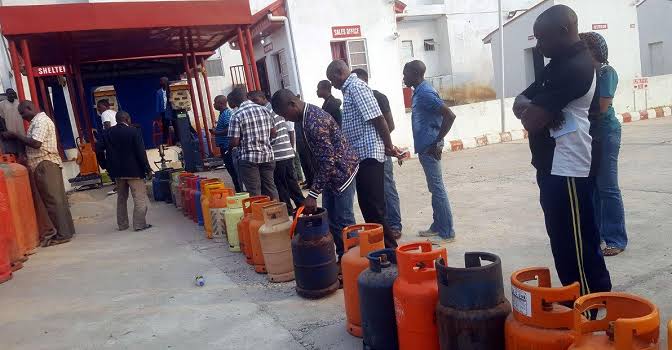
Nigerians Groan as Cooking Gas Price Soars to ₦1,800 Per Kilogram Amid Nationwide Shortage

A wave of frustration has swept across Nigerian households as the price of Liquefied Petroleum Gas (LPG), popularly known as cooking gas, has skyrocketed to between ₦1,600 and ₦1,800 per kilogram in several cities. The sharp rise comes amid a nationwide shortage triggered by a three-day strike that rattled the nation’s energy supply chain.
The strike, led by the Petroleum and Natural Gas Senior Staff Association of Nigeria (PENGASSAN), was staged to protest the dismissal of several workers at the Dangote Refinery, Africa’s largest single-train refinery project. Though the union suspended its industrial action last week, the ripple effects have continued to bite hard, leaving many gas depots across the country dry and forcing retailers to ration supplies.
In Abuja, the situation is grim. Refilling a standard 12.5kg cylinder now costs between ₦17,000 and ₦18,750, depending on the area. From Wuse to Garki and down to Kubwa, residents are lamenting how the price of gas has jumped from ₦1,000 per kilogram just weeks ago to as high as ₦1,500 in some outlets. In Jabi, several stations were either out of stock or selling at record-high prices, with some residents accusing retailers of hoarding gas to exploit the crisis.
In Lagos and Ogun States, the story is no different. A kilogram of LPG that sold for around ₦1,000 last week now costs between ₦1,300 and ₦1,800, depending on the location. Similar price surges have been reported in Port Harcourt, Cross River, Kano, and Kaduna, as the shortage tightens its grip nationwide.
Retailers say they have no choice but to raise prices due to supply disruptions and rising transportation costs from depots that are struggling to meet demand. Some vendors in Lagos confirmed that deliveries were delayed for days during the strike, creating a backlog that has yet to clear even after operations resumed.
The timing of the crisis could not be worse. With inflation already choking household budgets, many families are being forced to cut down on cooking or switch temporarily to kerosene and charcoal—options that are both costly and environmentally hazardous.
Energy experts warn that without a steady gas supply and improved domestic production capacity, such price shocks could become more frequent. “The temporary strike only exposed how fragile Nigeria’s LPG distribution network really is,” an analyst told Busterblog.com. “Until the government and private operators stabilize refinery output and address logistics bottlenecks, Nigerians will continue to pay more for basic energy.”
For now, the return of gas supply remains painfully slow. In neighborhoods across the country, the familiar sound of clanging cylinders and long queues at gas stations serve as a stark reminder that, in Nigeria, even the simplest flame comes at a heavy price.

